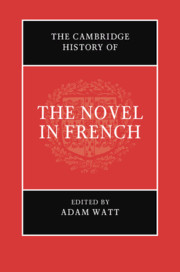Book contents
- The Cambridge History of the Novel in French
- The Cambridge History of the Novel in French
- Copyright page
- Contents
- Figures
- Contributors
- Acknowledgements
- Note on Conventions
- Chronology
- Introduction
- Part I Beginnings: From the Late Medieval to Madame de Lafayette
- Part II The Eighteenth Century: Learning, Letters, Libertinage
- Part III After the Revolution: The Novel in the Long Nineteenth Century
- Part IV From Naturalism to the Nouveau Roman
- 22 The Republic of Novels: Politics and Late Nineteenth-Century French Fiction
- 23 Medicine, Sex and the Novel: Maupassant and Rachilde
- 24 The Roman-Fleuve
- 25 Marcel Proust’s À la recherche du temps perdu
- 26 The Novel in France Between the Wars
- 27 Existentialism and the Novel
- 28 Suspicion and Novelty: The Nouveau Roman
- 29 The Holocaust and the Novel in French
- Part V Fictions of the Fifth Republic: From de Gaulle to the Internet Age
- Index
- References
27 - Existentialism and the Novel
from Part IV - From Naturalism to the Nouveau Roman
Published online by Cambridge University Press: 04 February 2021
- The Cambridge History of the Novel in French
- The Cambridge History of the Novel in French
- Copyright page
- Contents
- Figures
- Contributors
- Acknowledgements
- Note on Conventions
- Chronology
- Introduction
- Part I Beginnings: From the Late Medieval to Madame de Lafayette
- Part II The Eighteenth Century: Learning, Letters, Libertinage
- Part III After the Revolution: The Novel in the Long Nineteenth Century
- Part IV From Naturalism to the Nouveau Roman
- 22 The Republic of Novels: Politics and Late Nineteenth-Century French Fiction
- 23 Medicine, Sex and the Novel: Maupassant and Rachilde
- 24 The Roman-Fleuve
- 25 Marcel Proust’s À la recherche du temps perdu
- 26 The Novel in France Between the Wars
- 27 Existentialism and the Novel
- 28 Suspicion and Novelty: The Nouveau Roman
- 29 The Holocaust and the Novel in French
- Part V Fictions of the Fifth Republic: From de Gaulle to the Internet Age
- Index
- References
Summary
From the late 1930s until at least the mid-1950s, the novel in France provided a crucial form of expression for the eclectic philosophy of atheistic existentialism. The existentialist novel, whose principal proponents were Jean-Paul Sartre and Simone de Beauvoir, acted as a bridge between philosophy and literature to throw the individual into the world to face a metaphysical crisis which ‘reveals’ mortal existence. A quest for freedom and authenticity ensues to stave off bad faith (or the delusion of a fixed and necessary existence), the stakes often heightened by the wartime existential situation of many of these novels. With no recourse to any universal moral precepts, their characters find no neat resolutions to the problems of existence or to their responsibility to others, since the purpose of existentialist literature is not to offer metaphysical consolation but rather to engage its readers actively in the world as it appears in all its ambiguity. Similarly, the existentially committed writer must write for the current era in which they find themselves, not for some projected and idealised posterity. Despite its resolutely humanistic assumptions, the existentialist novel in its various guises sought to face the moral complexities and failures of the mid-twentieth century, resituating the human in an ever-ambiguous life-world.
Keywords
- Type
- Chapter
- Information
- The Cambridge History of the Novel in French , pp. 490 - 507Publisher: Cambridge University PressPrint publication year: 2021

